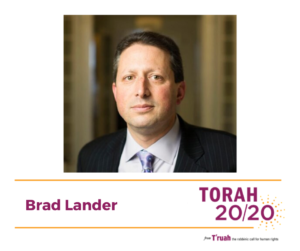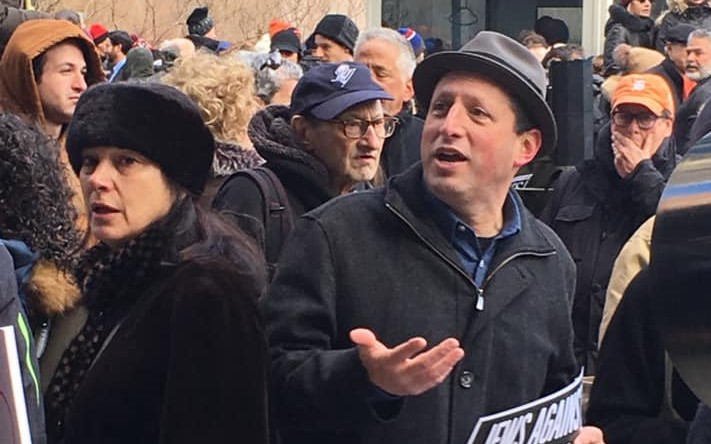A d’var Torah for Shemot (Ex.1:1-6:1) by New York City Councilman Brad Lander.
It’s hard to read Shemot without frightening shocks of recognition.
In this week’s portion, the crisis of oppression and enslavement begins. The Hebrews have been made refugees from their home in Canaan by poverty. (And it’s worth noting that “famine” is a term designed to make our people feel like “deserving poor,” to argue that their poverty isn’t their fault, since we so often blame refugees for the poverty or wars that force them to flee.)
Now, just as they are starting to thrive as immigrants in Egypt, the Hebrews become the target of Pharaoh’s authoritarian populist fear-mongering:
“The children of Israel were fruitful and swarmed and increased and became very strong, and the land became filled with them. A new king arose over Egypt, who did not know about Joseph.
“He said to his people, ‘They’re sending people that have a lot of problems, and they’re bringing those problems with us. They’re bringing drugs. They’re bringing crime. They’re rapists. And some, I assume, are good people.'”
Oops, sorry, getting the stories mixed up.
Sign up to receive Torah 20/20 in your inbox each week.
Pharaoh said: “Behold, the people of the children of Israel are more numerous and stronger than we are. Get ready, let us deal shrewdly with them, lest they increase, and a war befall us, and they join our enemies and wage war against us and depart from the land.” (Exodus 1:7-10)
Pharaoh’s authoritarian populism works, sparking xenophobia in the Egyptians, who respond:
“Why hello there HIAS! You like to bring in hostile invaders to dwell among us?!”
Oops, sorry again, that’s not an Egyptian, that’s the xenophobic murderer who killed 11 Jews in Pittsburgh.
In Shemot, “The Egyptians enslaved the children of Israel with back breaking labor. And they embittered their lives with hard labor, with clay and with bricks and with all kinds of labor in the fields, all their work that they worked with them with back breaking labor.” (1:13-14)
In both cases, the leader’s authoritarian populism works, with brutal outcomes. The immigrants are dehumanized, sharp lines are drawn, inequality widens, and civil society corrodes.
Then, the resistance begins. Here too, the story plays out with a chilling familiarity. Women lead the resistance, with courage and ingenuity. Shifrah and Puah bravely refuse Pharaoh’s evil order to kill Hebrew children, first boldly, then secretly. Just as now the Women’s March, Indivisible, the Squad are all led by women. But then Moses and Aaron take over, a pattern familiar in many of our organizations and just as stark when we look at the Democratic presidential debate stage.
Our failure to nurture inclusive multiracial societies overlaps with our failure to build gender-equal ones. At the first Women’s March, Rabbi Joseph Berman marched with a sign that had an image of Trump on one side with the words “a new king arose in Egypt who did not know…” and the back said “be like the midwives.”
Oppression and resistance then, oppression and resistance now.
Find more commentaries on Parshat Shemot
Shemot offers a range of lessons that are useful in building and sustaining resistance, for the short and long term.
- The Hebrews build their resistance through non-cooperation, organizing, and building power where they are, in their homes, workplaces, and communities. Midwives Shifrah and Puah engage in workplace resistance. Over the past three years, we’ve seen extensive community organizing, with Indivisible and other grassroots groups organizing town halls and chapters in every corner of the country to oppose corruption and oppression. And we’ve seen a big uptick in workplace organizing too, from teachers, fast-food workers, airline workers, and more. But so far, there has not been much connection between those struggles. Maybe Shemot tells us it’s time to connect the dots.
- Shemot is all about organizing rhythms. Things get worse before they get better, in a kind of cycle, with backlash as Pharaoh requires the Hebrews to build bricks without straw, just for asking for a few days off for a religious festival, in a cycle that will repeat itself with the plagues. Oppression, agitation, reaction, agitation, reaction, agitation, winning. We’re seeing some of that right here in New York State this week, in fierce backlash against bail reform that we won after much agitation last year. Hopefully we too are building power for the long term.
- Oppression forges solidarity. Though Moses is comfortable in his life as an adopted son of Pharaoh, the oppression he witnesses pushes him to choose the side of his birth people. Earlier this month, our Jewish people came together in unity as well, in response to antisemitism, with secular and religious, liberal and conservative, so many different kinds of Jews marching over the Brooklyn Bridge. For many of us, it was the first time we’ve acted in solidarity with our Chasidic sisters and brothers. Can we sustain that unity across so many other differences? And can we build that solidarity with so many other people facing hatred, bigotry, racism, xenophobia, Islamophobia at this moment?
- What kind of leadership? Moses resists God’s call to lead the people. He’s not eloquent, he protests, slow of speech and tongue. Please send someone else, he pleads. Because of his hesitance, God ensures that Aaron will be with him, and Miriam his sister is always there as well. Soon his father-in-law Jethro will help create a system of governance with many sub-leaders. Our movements need leadership, but it’s rarely been more clear that we need leaders who aren’t in it for their own self-aggrandizement. How can we ensure that our organizations build a culture of shared leadership, push people who don’t gravitate toward leadership to take it on, and create structures to hold people accountable?
Still, for all those lessons, I keep coming back to those same big shortcomings, then and now.
What if the Hebrews’ resistance campaign had aimed to build an inclusive, multiracial democracy in Egypt, with no slavery, and maybe a gradual end to the monarchy? (Maybe Pharaoh’s son could have married a gorgeous mixed-race Hebrew, and they could have “stepped back” from the monarchy together.)
Or what if they had taken the lessons of Egyptian xenophobia with them back to Israel — which God calls here “a good and spacious land, a land flowing with milk and honey — the home of the Canaanites, Hittites, Amorites, Perizzites, Hivites and Jebusites” (Exodus 3:7) — and worked with all those folks to build an inclusive democracy there, with less inequality, one that welcomes strangers?
And what if they had made sure women were leading visibly? What if Miriam’s dancing with her timbrels hadn’t waited until they were across the sea? Could they have forged something even more transformative?
Those requests might sound fanciful for Exodus. But thousands of years later, how much better are we doing?
We could be excused for seeking shortcuts to the Promised Land, something easier than building truly inclusive, multiracial democracy. Something less demanding than radical empathy and genuine equality. Something less backlash-provoking than honestly confronting and dismantling the systemic privileges of racism and sexism.
 Compared to the work to get there, 40 years in the wilderness seems almost easy.
Compared to the work to get there, 40 years in the wilderness seems almost easy.
But reading Shemot in 2020, I think the lesson is that — in Egypt, in Israel, in the United States — there is no way out but through.
Brad Lander is a member of the New York City Council, representing the 39th District in Brooklyn. He co-founded the Council’s Progressive Caucus, helped bring participatory budgeting to NYC, launched the grassroots organizing of #GetOrganizedBK in the wake of the 2016 election, and has led the way toward a more just, equitable, and sustainable city.

